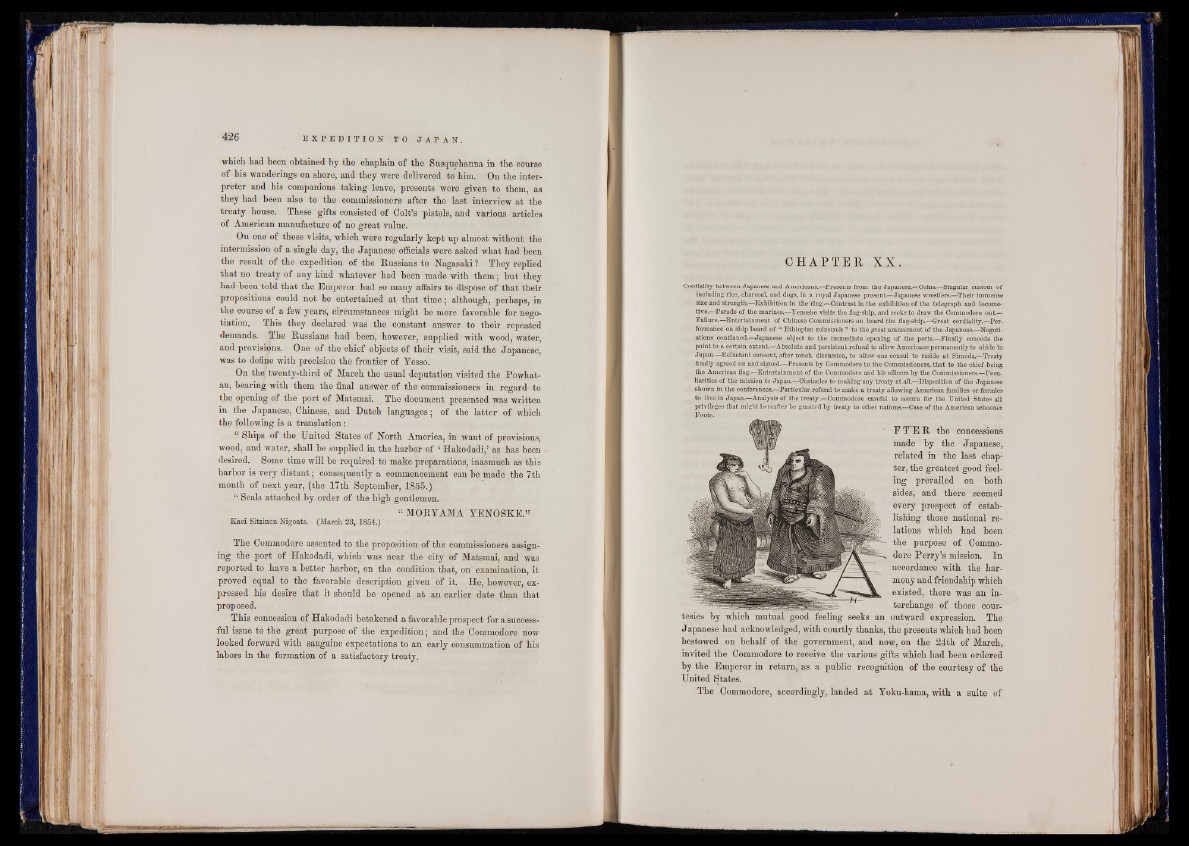
which had been obtained by the chaplain of the Susquehanna in the course
of his wanderings on shore, and they were delivered to him. On the interpreter
and his companions taking leave, presents were given to them, as
they had been also to the commissioners after the last interview at the
treaty house. These gifts consisted of Colt’s pistols, and various articles
of American manufacture of no .great value.
On one of these visits, which were regularly kept up almost without the
intermission of a single day, the Japanese officials were asked what had been
the result of the expedition of the Russians to Nagasaki ? They replied
that no treaty of any kind whatever had been made with them; but they
had been told that the Emperor had so many affairs to dispose of that their
propositions could not be entertained at that time; although, perhaps, in
the course of a few years, circumstances might be more favorable for negotiation.
This they declared was the constant answer to their repeated
demands. The Russians had been, however, supplied with wood, water,
and provisipns. One of the chief objects of their visit, said the Japanese,
was to define with precision the frontier of Tesso.
On the' twenty-third of March the usual deputation visited the Powhatan,
bearing with them the final answer of the commissioners in regard to
the opening of the port of Matsmai. The document presented was written
in the J apanese, Chinese, and Dutch languages; of the latter of which
the following is a translation:
lt Ships of the United States of North America, in want of provisions,
wood, and water, shall be supplied in the harbor of ‘ Hakodadi,’ as has been
desired. Some time will be required to make preparations, inasmuch as this
harbor is very distant; consequently a commencement can be made the 7th
month of next year, (the 17th September, 1855.)
“ Seals attached by order of the high gentlemen.
“ MORYAMA YENOSKE.”
Kaei Sitzinen Nigoats. (March 23, 1854.)
The Commodore assented to the proposition of the commissioners assigning
the port of Hakodadi, which was near the city of Matsmai, and was
reported to have a better harbor, on the condition that, on' examination, it
proved equal to the favorable description given of it. He, however, expressed
his desire that it should be opened at an earlier date than that
proposed.
This concession of Hakodadi betokened a favorable prospect for a successful
issue to the great purpose of the expedition; and the Commodore now
looked forward with sanguine expectations to an early consummation of his
labors in the formation of a satisfactory treaty.
CHAPTER XX.
Cordiality between Japanese and Americans.—Presents from the Japanese,—Coins.—Singular custom of
including rice, charcoal, and dogs, in a royal Japanese present.—Japanese wrestlers.—Their immense
size and strength.—Exhibition in the ring.—Contrast in the exhibition of the telegraph and locomotive.—
Parade of the marines.—Yenoske visits tho flag-ship, and seeks to draw the Commodore o u t—
Failure.—Entertainment of Chinese Commissioners on hoard the flag-ship.—Great cordiality.—Performance
on ship board of “ Ethiopian minstrels ” to the great amusement of the Japanese.—Negotiations
continued.—Japanese object to the immediate opening of the ports.—Finally concede the
point to a certain extent.—Absolute and persistent refusal to allow Americans permanently to abide in
Japan.—Reluctant consent, after much discussion, to allow one consul to reside at Simoda.—Treaty
finally agreed on and signed.—Presents by Commodore to the Commissioners, that to the chiof being
the American flag.—Entertainment of the Commodore and his officers by the Commissioners.—Peculiarities
of the mission to Japan.—Obstacles to making any treaty at all.—Disposition of the Japanese
shown in the conferences.—Particular refusal to make a treaty allowing American families or females
to livo in Japan.—Analysis of the treaty.—Commodore careful to secure for the United States all
privileges that might hereafter be granted by treaty to other nations.—Case of the American schooner
Foote.
F T'E R the concessions
made by tbe Japanese,
related in the last chapter,
the greatest good feeling
prevailed on both
sides, and there seemed
every prospect of establishing
those national relations
which had been
the purpose of Commodore
Perry’s mission. In
accordance with the harmony
and friendship which
existed, there was an interchange
of those courtesies
by which mutual good feeling seeks an outward expression. The
Japanese had acknowledged, with courtly thanks, the presents which had been
bestowed on behalf of the government, and now, on the 24th of March,
invited the Commodore to receive the various gifts which had been ordered
by the Emperor in return, as a public recognition of the courtesy of the
United States.
The Commodore, accordingly, landed at Yoku-hama, with a suite of